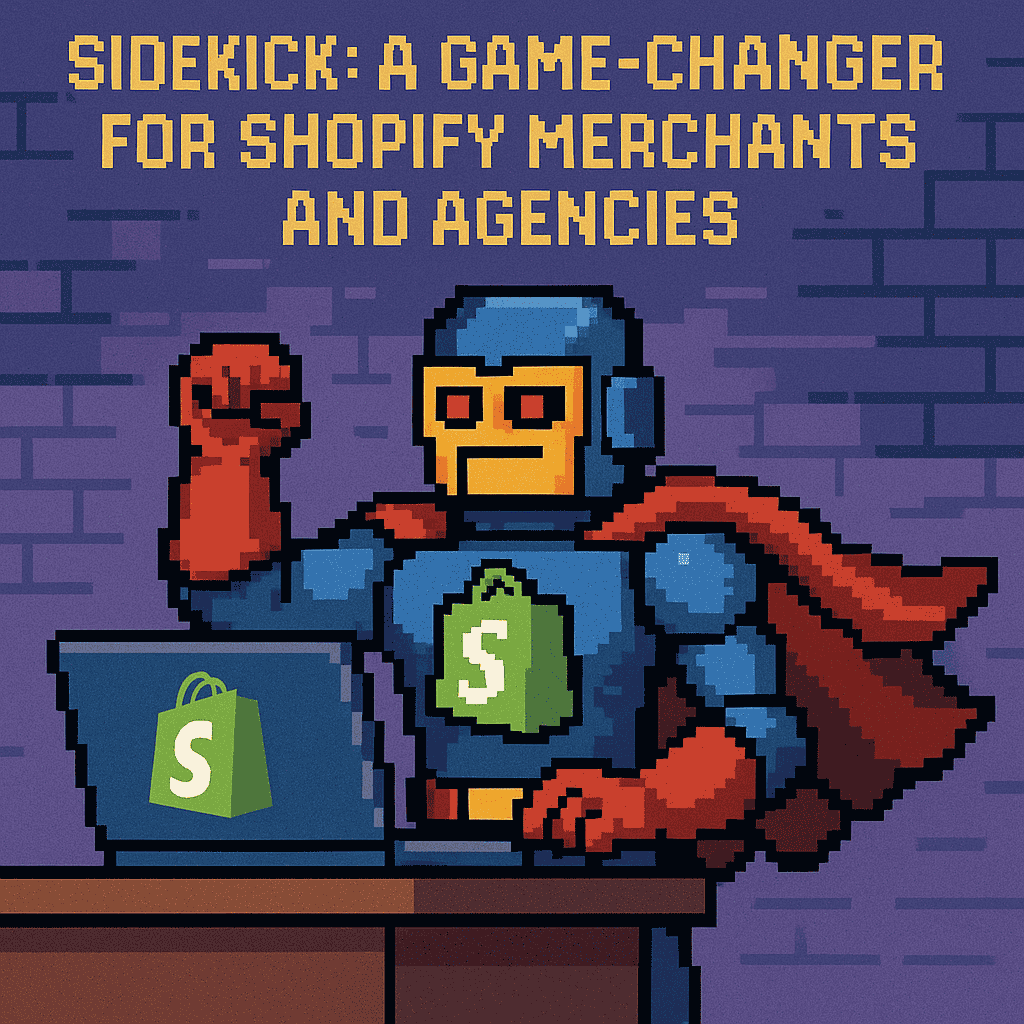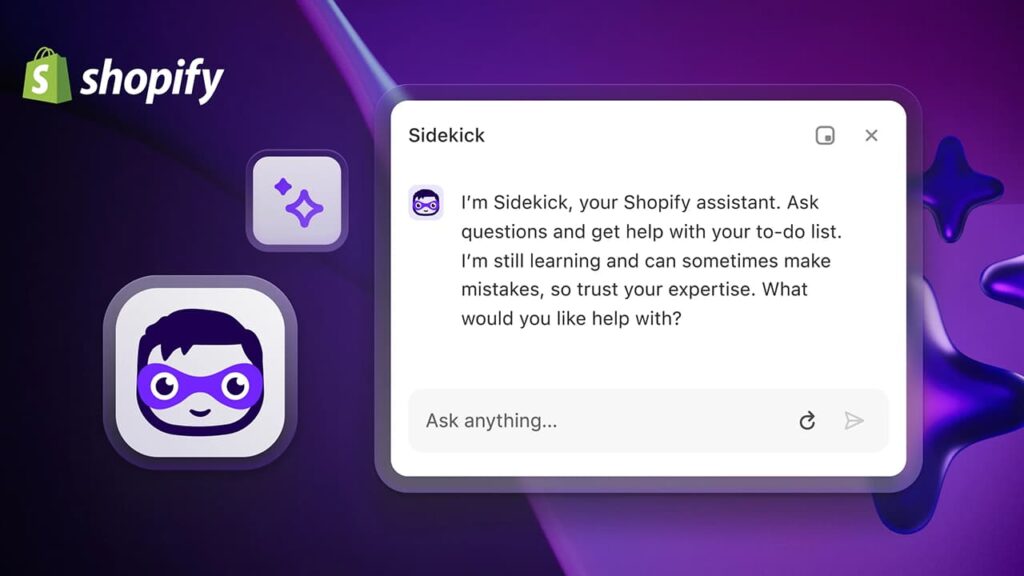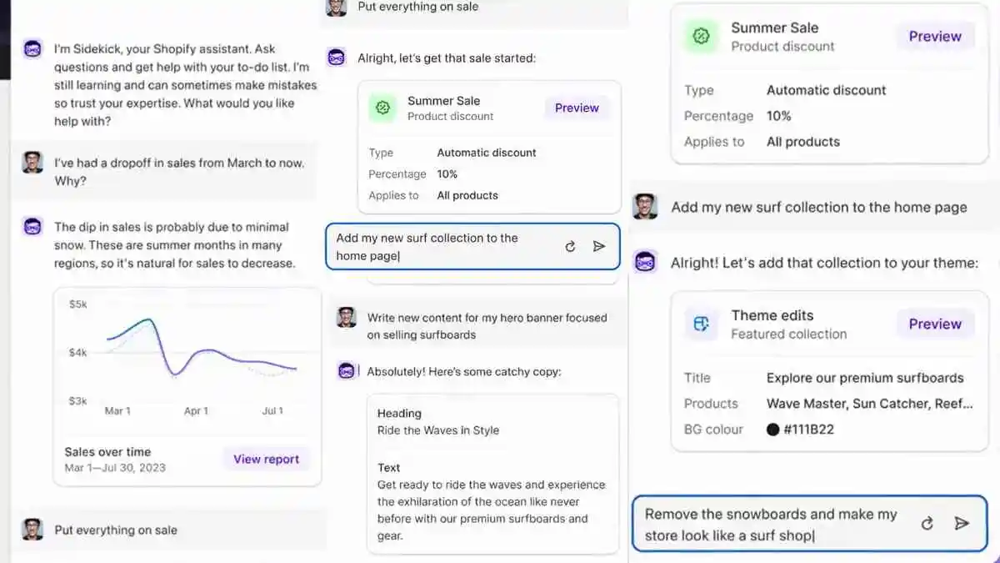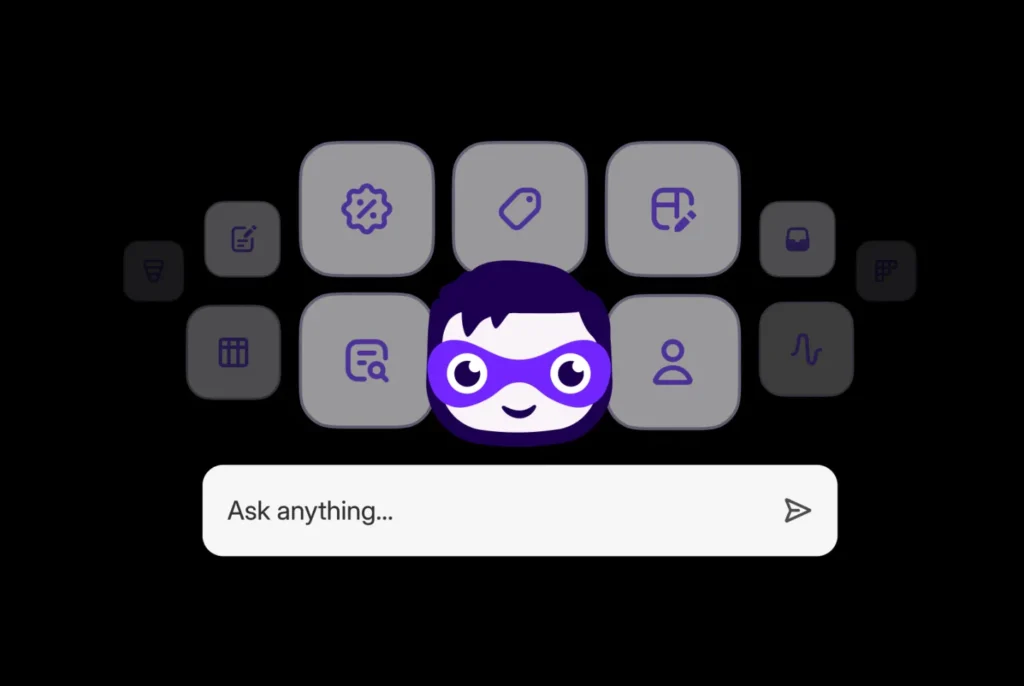
Since the heavy operational load of running an ecommerce store, automation and intelligent assistance are no longer luxuries; they’re necessities. Shopify Sidekick, the platform’s new built-in AI assistant, aims to transform how merchants and agencies manage their Shopify stores. At Craftshift, we’re excited about the possibilities Sidekick brings, and by the end of this overview, we think you will be too.
What Is Sidekick?
Sidekick is Shopify’s AI-commerce assistant integrated directly into the admin dashboard. Powered by Shopify’s generative AI suite (Shopify Magic), it’s trained to know all of Shopify, from store settings to sales data, and uses that knowledge, plus your shop’s context, to provide highly personalized support for a range of tasks. You interact with Sidekick through a chat interface (via text or even voice commands), using everyday language to ask questions or give instructions. Don’t worry, Sidekick never makes changes without your approval; it will present actions or suggestions for you to review and confirm before applying them. Think of it as a tireless assistant for your Shopify backend: intelligent, fast, and fully embedded in your workflow.

What can Sidekick do? In a nutshell, it understands natural language commands and can carry out or assist with tasks such as:
- Writing product descriptions: Generate high-quality, polished product copy (tailored to your brand voice and SEO-friendly).
- Answering support queries: Draft replies to common customer questions or create FAQ content based on your policies.
- Creating discounts: Set up promo codes and automatic discounts (no need to dig through discount menus).
- Analyzing store data: Pull up sales reports, interpret analytics, and highlight trends or anomalies.
- Offering business insights: Provide data-driven answers to questions like “What were my best-selling items last week?” or “Which marketing channel has the highest ROI?” and suggest next steps.
In practice, Sidekick functions like a virtual business consultant embedded in your Shopify admin. You can ask it things like “Why are my sales down this week?” or “Help me launch a Father’s Day promotion”, and it will draw on your store’s data and Shopify’s knowledge base to deliver an answer or even execute the task for you. It’s always on and always ready to help, truly a game-changer for day-to-day productivity on Shopify.
Core Use Cases for Shopify Merchants
Sidekick shines in many aspects of store management. Here are some of the core use cases where Shopify merchants can leverage Sidekick to decrease their workload:
- Easier Store Management: Routine store tasks become much simpler with Sidekick. Instead of clicking through numerous menus, merchants can just tell Sidekick what they need. For example, you could type: “Create a 20% off Father’s Day discount on all watches”, and Sidekick will instantly set up the automatic discount for you. No manual form-filling, no hunting through settings, it’s done in seconds. In one demo, Shopify’s CEO asked why a category’s sales had dropped, and Sidekick not only identified the likely cause (a seasonal dip in demand) but also, on command, put those products on sale and revamped the homepage to boost visibility, all within a few moments. Sidekick removes frictions from everyday operations; whether it’s launching a flash sale, updating a policy page, or checking an order status, you simply ask and it happens. The result is less time spent on menial admin and more time to focus on growing your business (with no delays or menu-digging required).
- Optimized Product Listings: Crafting product descriptions and listings that both read well and rank well can be a challenge for busy merchants. Sidekick, supercharged by Shopify Magic, makes this much easier. You can ask it to “Write an SEO-friendly product description for my new running shoes in a playful tone,” and it will generate a high-quality description tailored to that style. These AI-generated descriptions aren’t just convenient, they’re effective. They tend to naturally include relevant keywords and marketing copy that improves your product’s visibility on search engines and appeals to shoppers. Early feedback showed that stores using Shopify’s AI for product descriptions saw a 20–25% increase in product discovery, thanks to content enriched with relevant search terms and optimized phrasing. By using Sidekick to keep your product titles, descriptions, and even image alt-text optimized, you improve both conversion rates and SEO without needing an in-house copywriter.
- Data-Driven Decision Support: Sidekick can serve as your personal data analyst, translating your store’s analytics into plain English insights. Instead of being lost over spreadsheets or exported reports, you can ask Sidekick questions like “Which products had the highest ROI last quarter?” or “Show me a sales trend for this month versus last month.” It will crunch the numbers and provide you with an answer or a simple chart. Because it’s trained on all your store data, it can connect the dots across sales, marketing, and customer behavior to surface insights that matter. For example, if you prompt, “Identify any sales spike anomalies in the past week,” Sidekick might point out that a social media mention on Tuesday led to a traffic surge and an increase in sales of a particular item. This type of analysis, which would take hours to compile manually, is delivered in seconds. In short, Sidekick helps merchants make data-driven decisions by providing analytics and answering ad-hoc business questions on the fly, all without requiring you to be an expert in Excel or data.
- Automated Customer Communication: Maintaining consistent, on-brand communication with customers is another area where Sidekick assists. It can draft email responses to customers, create templates for tasks such as order follow-ups or delayed shipping notifications, and even suggest content for your social media posts. All you need to do is give Sidekick a prompt (e.g., “Compose a friendly reply to a customer asking about our return policy” or “Draft a Facebook post announcing our new summer collection”). It will provide a helpful starting point that you can adjust as needed. Sidekick is context aware tool, so it can pull in details like customer names, order items, or tracking info when drafting support emails. By leveraging this, merchants can save hours each week on writing routine communications. Moreover, Sidekick’s responses can be tuned to match your brand voice (professional, casual, witty, etc.), ensuring consistency across channels. Shopify has even integrated Sidekick’s capabilities into Shopify Inbox (the customer chat app), meaning it can suggest quick replies to common inquiries in live chat. Overall, you get to respond faster and more consistently to customers, improving service quality without adding headcount.

Key Benefits for Shopify Agencies
For agencies and developers who manage Shopify stores for clients (or build custom Shopify solutions), Sidekick is not just a merchant tool; it’s an efficiency booster for your operations as well. Here are some benefits Shopify agencies can reap:
- Faster Onboarding: Setting up a new client’s store can involve numerous setup tasks. Sidekick can accelerate the onboarding process by handling many of those initial to-dos. Do you need a starter FAQ page based on the client’s policies? Sidekick can draft it. Do you need sample product descriptions or collection pages populated with some baseline content? Sidekick can generate them from a simple prompt about the client’s industry and tone. It can even walk you through configuring settings (shipping, taxes, etc.) if you ask, “Help me set up shipping rates for a boutique apparel store,” providing step-by-step guidance. This means your team spends less time on basic setup and can move faster to the strategic or creative work that truly adds value.
- Client Empowerment: Once you hand over a store to a client, training and support requests can consume a significant amount of time. Sidekick can function like an on-demand trainer and helper for your clients’ day-to-day questions, reducing their reliance on your support team for minor issues. For example, a client could ask Sidekick, “How do I add a new product with variants?”, and Sidekick will guide them interactively through the process. Clients can also use Sidekick to run quick tasks (“duplicate this product for a new color variant”) or get marketing ideas without always coming back to your agency. This empowers clients to be more self-sufficient in operating their store. As an agency, you’ll likely see fewer basic support tickets, freeing you up to focus on high-value strategic guidance and development work. Essentially, Sidekick serves as a 24/7 assistant for your clients, which makes your agency look good for recommending cutting-edge tools while also lightening your support load.
- Enhanced Service Offerings: Agencies can fold Sidekick’s capabilities into their own service offerings to provide more data-driven recommendations and creative solutions. The AI can quickly surface insights that might take an analyst hours to compile, such as identifying the top conversion funnel drop-off points or suggesting which customer segment responded best to last month’s campaign. Your team can ask Sidekick for analyses or even brainstorming help. (Imagine querying, “Give me three marketing campaign ideas for a fitness apparel store’s holiday sale based on last quarter’s customer behavior,” and getting instant, customized suggestions.) You can use these insights to supplement your strategy presentations, CRO (conversion rate optimization) reports, and marketing plans with concrete data. Sidekick can even help generate drafts of reports or plans. One could literally ask, “Create an action plan for a two-week promotion targeting underperforming products,” and get a structured list of ideas and steps that your strategists can then refine. By leveraging AI in this way, agencies stay at the forefront of innovation, deliver more value to clients (with real-time store data to support recommendations), and potentially serve more clients without proportionally increasing their team size.

Major Updates You Should Know
Shopify Sidekick is not a static tool; it’s evolving, with Shopify rolling out new features and improvements as AI capabilities grow. As of June 2025, here are some major updates and enhancements to Sidekick that merchants and agencies should be aware of:
- Sidekick’s Capabilities Just Expanded: Recent updates have given Sidekick much deeper “smarts” and integration with Shopify’s backend. The assistant now supports multi-step reasoning and analytics, meaning it can analyze multiple data sources at once to diagnose issues and propose solutions (for example, investigating a sales drop by looking at marketing stats, inventory levels, and traffic in tandem). It also introduced several new AI powers. One is real-time sales and traffic forecasting. Sidekick can project your upcoming sales or foot traffic based on historical trends, helping you anticipate demand and stock accordingly. Another is auto-suggested pricing optimizations; using market data and your sales performance, the AI can recommend pricing adjustments to maximize revenue (a dynamic pricing capability that was previously the realm of enterprise tools). Sidekick can even perform LLM-driven customer sentiment analysis, which involves reading through customer reviews, ratings, or feedback and summarizing the overall sentiment (e.g., “Customers love the product quality but often mention slow shipping”). This helps you quickly understand customer satisfaction and pinpoint areas to improve. On top of all that, Shopify added built-in image generation to Sidekick. You can now ask the assistant to create custom images (for example, “Generate a hero banner image with a summer theme for my homepage”), and it will produce a graphic using AI. This feature helps merchants quickly get visually appealing graphics for promos or blog posts without needing a designer for simple tasks. In short, Sidekick is becoming a one-stop shop for analysis, decision support, and even creative content generation.
- Custom LLM Personalization Coming: One of the most exciting things on the roadmap is the ability to personalize and train Sidekick’s AI model for your specific brand. Shopify has hinted that soon merchants will be able to feed Sidekick with their own brand’s past content, style guidelines, and preferences so that the AI’s outputs become uniquely customized. In practice, this might mean Sidekick could learn your brand voice (from, say, your existing product descriptions or blog posts) and then always generate text in that voice by default. Or you might be able to give it feedback like, “Prefer a more playful tone in responses,” and it will adapt. This custom training would make Sidekick even more powerful, as its suggestions and creations will align perfectly with your brand identity and niche. Shopify’s vision is clearly to move toward highly brand-specific AI assistance. Keep an eye on Sidekick; the ability to fine-tune Sidekick with your own data will be a game-changer for merchants who have a very distinct style or set of processes. It’s the difference between a generic AI assistant and your own AI assistant who “gets” your business.
SEO & LLM: A Perfect Match
Sidekick doesn’t just help manage your store; it can also boost your search engine strategy. The integration of large language models into content creation offers a perfect synergy with SEO. Why? Because at its core, SEO (search engine optimization) is about high-quality, relevant content and proper site metadata, exactly the kind of stuff a well-trained AI excels at generating.
- Keyword-Optimized Content: Whenever Sidekick (or Shopify Magic) writes something for you, be it a product description, a blog post, or an FAQ answer, it’s drawing on a vast corpus of knowledge, including what makes content rank well on Google. The AI naturally includes pertinent keywords and phrases that shoppers are likely to search for, and it frames content in a clear, structured way. This means your product pages and articles have a better chance of ranking higher, simply because they’re rich in the kind of content search algorithms favor. In fact, Shopify’s AI tools have been noted to improve on-page SEO; they produce descriptions that are not only engaging for shoppers but also algorithm-friendly, helping your pages get discovered more often. And since Sidekick can do this in seconds, you’re more likely to keep all your pages fully populated with relevant descriptions and avoid “thin” content (which search engines dislike).
- Meta Tags and Beyond: Sidekick can assist in creating those behind-the-scenes elements like meta titles, meta descriptions, and image alt text, which are crucial for SEO but often overlooked by busy store owners. For example, if you add a new product, Sidekick could generate an SEO-optimized meta description for it (or you can ask it to), highlighting the main features and including a call-to-action. It might suggest alt text for your product images that actually describes the product with keywords (improving accessibility and SEO). By automating these small but important tasks, Sidekick ensures your site is following SEO best practices without you having to optimize every little detail manually. The AI is up-to-date on general SEO guidelines, so it will avoid things like keyword stuffing and instead focus on natural, relevant inclusion of terms. The outcome is a store that search engines perceive as highly relevant and informative for users, which can translate into higher rankings and more organic traffic over time.
In short, using Sidekick is like having an SEO consultant and copywriter on staff, continuously working in the background. It enhances your content marketing by ensuring every piece of content is top quality and aligned with what your audience is searching for. This perfect match of LLM-powered content generation and SEO can lead to your Shopify store attracting more visitors for free (via Google/Bing searches) and turning those visits into sales thanks to the compelling content and smooth experience Sidekick helps you provide.
At Craftshift, we see Shopify Sidekick as an enabler of more intelligent workflows, a tool that empowers both merchants and agencies to work more efficiently and creatively. This AI assistant, powered by cutting-edge LLM technology, gets better the more you use it (learning from your interactions) and is continually being refined and expanded by Shopify’s team. The result is an assistant tuned for your growth: it can handle the busywork, surface the insights you might miss, and even inspire new ideas, all while you focus on the strategic aspects of your business.
Whether you’re a merchant trying to save time or an agency scaling operations for dozens of clients, Sidekick offers a strategic advantage. It brings big-business capabilities (data analysis, automation, AI-driven content creation) into the hands of every user, no matter the size of your store. Embracing tools like Sidekick is not just about convenience; it’s about staying ahead in the competition. It allows you to respond faster, plan better, and ultimately provide a better experience to your customers. And as Shopify continues to enhance Sidekick, those who leverage it early will be best positioned to ride the wave of AI-driven commerce innovation.
In conclusion, Shopify Sidekick truly is a game changer for merchants and agencies. It’s like having an employee who is an expert marketer, savvy data analyst, and tireless shop assistant all in one, and who works 24/7 for you. We’re excited about what Sidekick can do today, and even more excited about what it will be able to do tomorrow. If you haven’t already, we highly recommend giving Sidekick a try on your Shopify store. It could just become the “sidekick” you needed to take your business to the next level. Here’s to smarter selling and happy customers!





